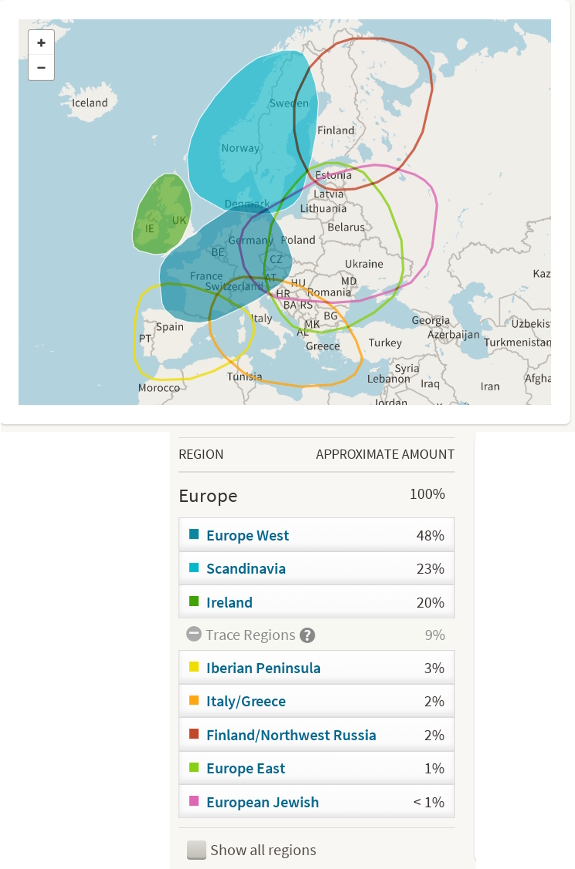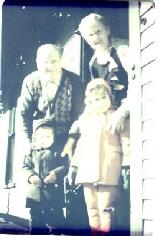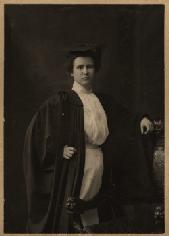
Mom's DNA test results

In Mom's family, there's
always been talk of "that woman," who introduced dark coloration to the
family. The romantic notion is that she was a gypsy shipwrecked off the
coast of New England. We decided to find out if that was really the
case, so Mom spit in a tube and we sent in her DNA to be analyzed.
 Two of Mom's grandparents came
to the U.S from Sweden during their lifetimes, so it's unsurprising
that Scandinavia makes up such a large chunk of her DNA markers.
The actual percent Scandinavian could range from 0 to 46, so I'm going
to guess that the average shown is a bit of an underestimate.
Two of Mom's grandparents came
to the U.S from Sweden during their lifetimes, so it's unsurprising
that Scandinavia makes up such a large chunk of her DNA markers.
The actual percent Scandinavian could range from 0 to 46, so I'm going
to guess that the average shown is a bit of an underestimate.
 The Rhode Island wing of Mom's
family can eventually be traced back to at least one ancestor who came
to North America in 1630 from England...and a bunch of other ancestors
with who-knows-what background. Based on Mom's DNA test results, it
looks like many of these unaffiliated ancestors may have been Irish or
from Western Europe (although Mom says Wales is the location most
spoken of in her family).
The Rhode Island wing of Mom's
family can eventually be traced back to at least one ancestor who came
to North America in 1630 from England...and a bunch of other ancestors
with who-knows-what background. Based on Mom's DNA test results, it
looks like many of these unaffiliated ancestors may have been Irish or
from Western Europe (although Mom says Wales is the location most
spoken of in her family).
What about "that woman"?
Maybe she was from Spain, Portugal, Italy, or Greece. Or maybe it was
just dark Irish coloration coming through. Unfortunately, the ancestor
in question has been dead for many, many years, so there won't be any
DNA test results to find out for sure.
Want more in-depth information? Browse through our books.
Or explore more posts by date or by subject.
About us: Anna Hess and Mark Hamilton spent over a decade living self-sufficiently in the mountains of Virginia before moving north to start over from scratch in the foothills of Ohio. They've experimented with permaculture, no-till gardening, trailersteading, home-based microbusinesses and much more, writing about their adventures in both blogs and books.
Want to be notified when new comments are posted on this page? Click on the RSS button after you add a comment to subscribe to the comment feed, or simply check the box beside "email replies to me" while writing your comment.

Very neat, to think of ages ago and changes in people's lifestyles and locations. Now I want to learn more about European history! But can you explain a bit about trace elements, and also about DNA in general? that is, how it is that some DNA is specifically Scandinavian, for ex? I guess that means that every Scandinavian person has some similar DNA, but why did it become differentiated, in the first place?y
Interesting DNA analysis. BBC News noted that Celts were not a distinct genetic group but more of a culture. http://www.bbc.com/news/science-environment-31905764
People seem to think that humans stayed in one place for generations and never moved around. Not true! Ancient peoples moved around a lot more than we moderns give them credit. After all, humans evolved in Africa and now we're spread out around the globe and trying to move to other planets. That's gotta be the ultimate "move" of them all.
Mom and Nayan --- I think both of you are interested in the how of the DNA test. Obviously, people do move around and intermarry, but we're more clannish than you might think. As with any type of evolution, the island effect means that groups that rarely interbreed tend to end up with different features --- for example, the straight dark hair that's common in Asia versus the blond hair of the typical person from Scandinavia.
Ancestry.com took a bunch of DNA samples (3,000) from 26 different regions to determine which markers show up in certain populations but not in others. Then they look for those markers in folks' DNA. Obviously, it's not perfect, but it's a fun start.
It's a pity that the results are so unspecific. The results basically says that your mother's recent ancestors are from somewhere in Europe.
If the test provides that information, you could look up the haplogroups she belongs to on eupedia. If you know both the Y-DNA and mtDNA haplogroups, you might get a better idea where her paternal and maternal ancestors possibly came from. For instance one map shows the distribution of haplogroups in different regions . And you can look up how prevalent y-DNA haplogroups and mtDNA haplogroups are by country.
It seems pretty much settled that if you look back far enough, our ancestors came from East-Africa. Exactly when homo sapiens spread out from Africa, in how many waves and by which route is not clear at the moment.
First of all, I have a problem with Ancestry.com's attempt to do a DNA test. That organization is owned by the Mormon church and they're really more interested in getting as many people "baptized" sureptitiously into their "Church" than anything else. You might remember the flak a few years back about their secretly baptizing Holocaust victims. Secondly, there's really no objective way to evaluate DNA results like this. I refer you to this article by the American Society of Human Genetics regarding same: http://arstechnica.com/uncategorized/2008/11/geneticists-sound-note-of-caution-over-dna-ancestry-testing/
Now, that's not to say that paying a small fee for these types of tests can't be done for amusement purposes, but I'd take the results with a grain of salt.